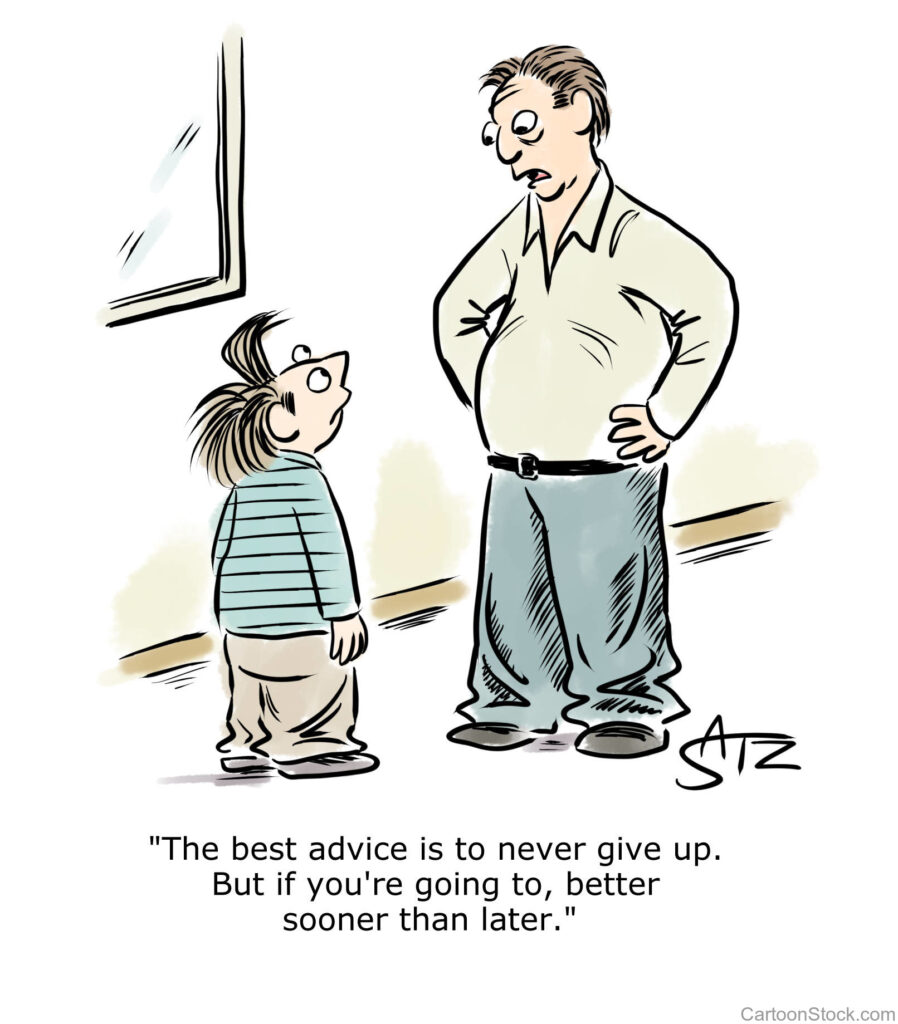
A particular phrase from Winston Churchill’s iconic speech to the British Empire during WW2 is well-known and oft-quoted: “Never give in, never, never, never, never.” Most of us are not familiar with the rest of the sentence: “except to convictions of honor and good sense.”
Grit, tenacity, determination, perseverance…these traits have been lionized as foundational and unquestionably beneficial. We’re taught from an early age to “stick with it and don’t give up.”
But often the best thing to do is to quit. So let’s add “the willingness to jettison” as a necessary and honorable character trait.
For instance:
- A Gallup poll found that 85 percent of workers were either “not engaged” with their work or “actively disengaged.” Why do these employees continue in a job they obviously don’t enjoy?
- Many college students declare a major before their freshman year. Halfway through their degree they realize that they don’t enjoy the subject and/or they’re not particularly good at it. But many persevere until they graduate and some even feel compelled to start their career in that field, often committing themselves to years of career-unhappiness.
- An entrepreneur will start a company that struggles for years, never getting traction or becoming profitable. But she won’t pull the plug.
- A company will produce a product or service that fails from the start, but tenaciously and hopelessly hold onto it.
I think there are two reasons we fall prey to this dilemma.
One, we yield to the sunk lost fallacy. Having invested time or money into something, we are hesitant to quit it because that would mean we would have wasted all that time and money (although they’re already lost). Often, the more we have invested and lost, the longer we persist in thinking it will work out.
Two, we were taught from an early age to never give up and to not renege on a promise or commitment. But sometimes the smartest and best thing to do is to stop in midstream and pursue something different. American computer scientist Paul Graham says, “We’ve all heard the theme of ‘don’t give up on your dreams.’ I know what that means, but this is a bad way to put it, because it implies you’re supposed to be bound by some plan you made early on. The computer world has a name for this: premature optimization. So instead of working back from a goal, work forward from promising situations. This is what most successful people actually do anyway. Instead of plan-and-implement, adopt a test-and-learn model.”
As comedian W. C. Fields said, “If at first you don’t succeed, try, try again. Then quit. There’s no use being a damn fool about it.”

I can certainly identify with this. All the signs were there. Giving up my
choir was very difficult, but the last incident was the final confirmation.
The Lord will lead me to a new service for him.
Marlon, we will miss you, a lot. But it was the right thing to do. Your health and wellbeing must be prioritized. Thanks for being my friend.
I would agree with the article except for the fact that a quit may not just affect me. Whenever a commitment is broken it has consequences. The weight of consequences for others must be considered. The example would be the Lord going to the cross. He asked for a way out.
I have tried to make sure I know the difference between commitment and preferences when deciding which to quit.
Dwight, thank you for seeing and sharing this other facet. When our quitting will affect other people we must be even more vigilant about doing it right. Thanks for sharing your thoughts.
Thank you that you put Winston Churchill’s quote into context. Sometimes we have to get to a point where we can park the project/business so it isn’t so much “giving up” but “laying it down”. Giving up has the implication that you just couldn’t cope with it any more whereas laying it down is purposeful and managed. If you employ staff and have customers and suppliers, other people will be affected by your decision.
Angela, I like your choice of words…laying it down; it’s more gentle and less final. But I do think sometimes one has to pull the plug.
Take care,
Don
Don, I purchased the book and am loving it! Thanks for the recommendation.
Thanks, Scott. Reading is one of the delights of life.
Don I loved this. You are right! I was always taught never to quit by my father. I love him dearly but watched him work in a job while telling himself he was happy. The job was working him – not the other way around.
Thanks, Diane, for sharing a personal anecdote. It’s sad that some people stay in a job they don’t enjoy for their entire life.
Take care. Don
Here I am 77 years old and I still have more true grit than John Wayne and you are just now getting around to telling me it is OK to give up sometimes. Where were you when I was 17, 27, 37, etc. when I needed to hear it.
David, interesting, isn’t it…we’ve been taught to never give up, but sometimes it’s the best thing to do…even at our age.
Thanks for sharing your thoughts.